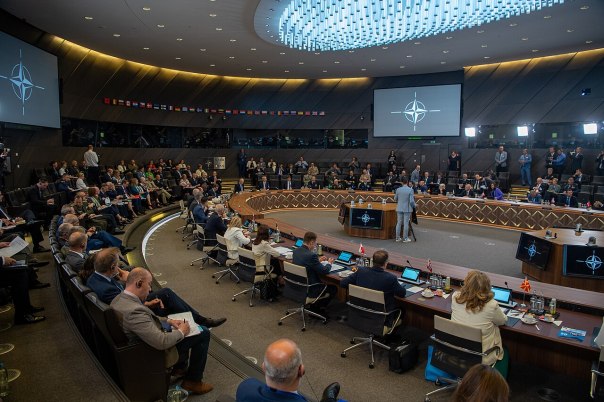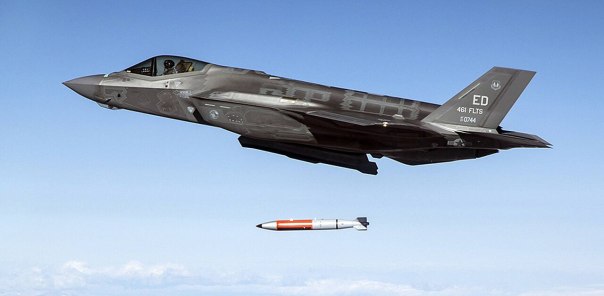No to Nuclear NATO
Article 5 of the North Atlantic Treaty declares that NATO members will assist another member if attacked by “taking action as it deems necessary, including the use of armed force.” But the UN Charter does not say anywhere that warmaking is authorized for whoever jumps in on the appropriate side.
The North Atlantic Treaty’s authors may have been aware that they were on dubious legal ground because they went on twice to claim otherwise, first adding the words “Any such armed attack and all measures taken as a result thereof shall immediately be reported to the Security Council. Such measures shall be terminated when the Security Council has taken the measures necessary to restore and maintain international peace and security.” But shouldn’t the United Nations be the one to decide when it has taken necessary measures and when it has not?
The North Atlantic Treaty adds a second bit of sham obsequiousness with the words “This Treaty does not affect, and shall not be interpreted as affecting in any way the rights and obligations under the Charter of the Parties which are members of the United Nations, or the primary responsibility of the Security Council for the maintenance of international peace and security.” So the treaty that created NATO seeks to obscure the fact that it is, indeed, authorizing warmaking outside of the United Nations — as has now played out in Yugoslavia, Afghanistan, and Libya.

While the UN Charter itself replaced the blanket ban on all warmaking that had existed in the Kellogg-Briand Pact with a porous ban plagued by loopholes imagined to apply far more than they actually do — in particular that of “defensive” war — it is NATO that creates, in violation of the UN Charter, the idea of numerous nations going to war together of their own initiative and by prior agreement to all join in any other member’s war. Because NATO has numerous members, as does also your typical street gang, there is a tendency to imagine NATO not as an illegal enterprise but rather as just the reverse, as a legitimizer and sanctioner of warmaking.
The Nuclear Nonproliferation Treaty forbids transferring nuclear weapons to other nations. It contains no NATO exception. Yet NATO proliferates nuclear weapons, and this is widely imagined as law enforcement or crime prevention. The prime minister of Sweden said in May that NATO ought to be able to put nuclear weapons in Sweden as long as somebody has determined it to be “war time.” The Nonproliferation Treaty says otherwise, and the people who plan the insanity of nuclear war say “What the heck for? We’ve got them on long-range missiles and stealth airplanes and submarines?”
The people of Sweden seem, at least in large part, to also want to say No Nukes — but when were people ever asked to play a role in “defending democracy”? The purpose of bringing nukes into Sweden, for those in the Swedish government who favor it, may in fact be purely a show of subservience to U.S. empire, driven by fear of its obliging partner in the arms race, the militarists in Russia.
Poland’s president says his country would be happy to have “NATO” nuclear weapons there, “war time” or not, and this proposal is reported in U.S. corporate media with no mention of any legal concerns and with the claim that it comes as a response to the Russian placement of nuclear weapons in Belarus. Last year I asked the Russian ambassador to the United States why putting nuclear weapons into Belarus wasn’t a blatant violation of the Nonproliferation Treaty, and he said, oh no, it was perfectly fine, because the United States does it all the time.
In fact, NATO itself owns and controls no nuclear weapons. Three NATO members own and control nuclear weapons. We cannot be certain how many weapons they have, since nuclear weapons are both justified with the dubious alchemy of “deterrence” and, contradictorily, cloaked in secrecy. The United States has an estimated 5,344 nuclear weapons, France an estimated 290, and Great Britain an estimated 240.
NATO calls itself a “nuclear alliance” and maintains a “Nuclear Planning Group” for all of its members — those with and those without nuclear weapons — to discuss the launching of the sort of war that puts all life on Earth at risk, and to coordinate rehearsals or “war games” practicing for the use of nuclear weapons in Europe. NATO partners Israel and Pakistan are estimated to possess 170 nuclear weapons each.
Five NATO members have U.S. nuclear weapons stored and controlled by the U.S. military within their borders: Belgium, Germany, Italy, the Netherlands, and Turkey. These are estimated at 35 nuclear weapons at Aviano and Ghedi Air Bases in Italy, 20 at Incirlik in Turkey, and 15 each at Kleine Brogel in Belgium, Volkel Air Base in the Netherlands, and Büchel Air Base in Germany. The United States is reportedly also moving its own nuclear weapons into RAF Lakenheath in the UK, where it has stored them in the past.

The people of each of these countries routinely protest the presence of nuclear weapons and have never been asked to vote on the matter. The notion that the nuclear weapons in a European country are still U.S. nuclear weapons and thus haven’t been proliferated is an odd fit with the general understanding of international treaties, which are conceived and written as if there were no such thing as empire.
With so-called U.S. or NATO nuclear weapons in potentially eight nations in Europe — and perhaps South Korea as well, at least on U.S. submarines docked there to please certain war-crazed South Koreans — there could soon be more nations in the world with “U.S.” nuclear weapons than nations with anybody else’s.
In recent years, the United States has been replacing its nuclear bombs stored in European nations with a newer model (the B61-12), while NATO members have been buying new U.S.-made airplanes with which to drop them. Turkey has had U.S. nukes stored in it even while U.S.-backed and Turkish-backed troops have fought each other in Syria, and even during a non-U.S.-backed coup attempt at the very base where the nuclear weapons are stored.
Seven other NATO members are said to support “nuclear missions” using their non-nuclear militaries: The Czech Republic, Denmark, Greece, Hungary, Norway, Poland, and Romania.
Poland and Romania also host new U.S./NATO missile bases that could launch missiles into Russia from very short distances, leaving the Russian government mere moments to decide whether the weapons are nuclear, or to decide whether to launch missiles of its own. The U.S. and NATO claim the bases are purely defensive, and various supporters of the bases have even claimed they had nothing to do with Russia—that they were either focused on Iran (then-U.S. President Barack Obama) or purely functioned as jobs programs for U.S. workers (former U.S. Ambassador Jack Matlock).
Meanwhile, the U.S. has been manufacturing what many of its officials describe as “more usable” or “tactical” nuclear weapons (merely several times the destructive power of what was used on Hiroshima). At the same time, the U.S. military is aware that, in its war game scenarios, the use of a single so-called “tactical” nuclear weapon tends to lead to all-out nuclear war. Or, as then-Secretary of Defense Jim Mattis told the House Armed Services Committee in 2018, “I don’t think there is any such thing as a ‘tactical nuclear weapon.’ Any nuclear weapon used any time is a strategic game-changer.”
The U.S.-made, disaster-prone F-35 is the first “stealth” airplane designed to carry nuclear bombs, meaning that it can in theory drop a nuclear bomb on a city with no warning from radar at all. The U.S./NATO have managed to sell F-35s to the U.S., UK, Italy, Netherlands, Norway, Denmark, Belgium, Poland, Israel, Australia, Japan, South Korea, and Singapore, with efforts under way to spread them to more nations, eventually perhaps creating a general need for them on the grounds of “interoperability.” The F-35 is currently being demonstrated on the people of Gaza.
The U.S. military has enough nuclear weapons in each of the following three forms to threaten all life on our planet: missiles on U.S. submarines in oceans around the world; bombs on U.S. airplanes circling the globe; and missiles in the ground in the United States. So why also keep nuclear bombs in European countries, where they would have to be loaded onto airplanes and flown (presumably to Russia) on missions either so “stealth” that they avoid all warning or so risky that they would have to be preceded by massive efforts to destroy air defenses?
If the decision to “go nuclear” were up to NATO, all members would have to reach a consensus on it. However, NATO has not always easily reached a consensus. For example, the U.S. attempted to bring NATO into its plans for a war on Iraq in 2003 but failed, in part because of huge public pressure against that war in NATO nations.
Nuclear war is one of the least popular ideas ever, so the launch of a nuclear weapon might have to be “stealth” not only in relation to Russia but also in relation to the Western public. If the U.S. decides to use nuclear weapons, it almost certainly will not bother trying to use the ones it keeps stored in Europe. For that matter, were U.S. officials intent on reaching secret bunkers under hills some distance from Washington, D.C., they would need significant warning that a nuclear war had been secretly scheduled — a problematic concept for both the idea of deterrence and the idea of democracy.

The purpose of NATO in the North Atlantic Treaty is supposed to be defense against an attack on Europe, not deterrence. But in the event of responding to such an attack, whether the response were nuclear or not, the U.S. bombs stored in Europe would probably not be used. Threats in the name of deterrence have tended to fuel arms races and wars. But keeping U.S. nuclear weapons in Europe seems to fail even by the usual standards of deterrence theory, since their most likely use would be in an unlikely secret attack. Some U.S. officials believe those nuclear bombs serve no “military purpose” but only a “political” one, to reassure the host countries that the U.S. government cares about them.
The argument has also been made that, since Russia would like the nuclear bombs removed from Europe, the U.S. should either keep them there or demand something huge from Russia in exchange for removing them. Another argument is that this is part of making European nations share the burden, along the lines of making them spend more money on weapons. But if the burden serves no purpose, why should anyone share it?
European government officials know the bombs are not useful as bombs. They know the bombs are provocative toward Russia. They know, in fact, that Russia is using the U.S. storage of nuclear bombs in European nations as an excuse to put Russian nuclear weapons into Belarus. So a more realistic understanding of the “political” purpose of U.S. nukes in Europe is probably a combination of the idea that the U.S. military will fight for any nation in which it has stored nukes, the perverse prestige that many imagine comes with possessing nukes (even if someone else actually possesses them on your land), and the general U.S. goals of keeping European governments intertwined with the U.S. military, supportive of U.S. military strategies, and willing to spend vast amounts on U.S.-made weapons.
Spreading along with nuclear weapons is nuclear energy — climate-disastrous, slow, expensive, super-dangerous nuclear energy, which creates permanent deadly waste, which poisons those around it, which no insurance company will insure, and the facilities for which constitute nuclear catastrophes waiting for accident or attack. Listen to Harvey Wasserman on what drugs you need to take in order to believe that nuclear energy is good for the climate. Not only are various nations pursuing nuclear energy in order to be closer to developing nuclear weapons, but nuclear NATO countries like the U.S. and UK are promoting this spread of nuclear technology at home and abroad because it is through nuclear energy that they maintain skills, training, and materials they want for nuclear weaponry.
There is a better way, and everyone who cares about avoiding nuclear apocalypse is invited to join in preparations for unwelcoming NATO to its 75th birthday party this July in Washington DC, July 6-7, 2024.
David Swanson is an author, activist, journalist, and radio host. He is executive director of WorldBeyondWar.org and campaign coordinator for RootsAction.org.
